KB Home to Settle FTC Arbitration Complaints
- Share via
KB Home said Tuesday that it had agreed to pay $2 million to settle complaints that it had again violated terms of a 26-year-old federal order prohibiting it from restricting customers’ rights to sue over alleged construction defects.
But the Los Angeles-based home builder could still face a class-action lawsuit on the matter. A hearing on the suit is set for next month in a Texas state court.
KB Home said it had been negotiating with the Federal Trade Commission for at least two years to resolve the latest dispute over its use of binding arbitration clauses in home warranties. Such clauses require customers to settle warranty complaints through arbitration rather than through the courts.
“Most warranty claims are resolved quickly and at this point we don’t use binding arbitration,” said KB Home spokeswoman Kate Mulhearn, who characterized the issue as a disagreement with the FTC over “language.”
Last week, KB Home agreed to pay another federal agency $3.2 million to settle allegations of lending practice violations by its home mortgage unit.
On Tuesday, the FTC declined to confirm whether it was in talks with the company. The agency also declined to comment on a Wall Street Journal report that it was planning to impose a multimillion-dollar fine on KB Home. Any proposed fine or settlement must be approved by the Justice Department.
Binding arbitration clauses are common in most new-home purchase agreements, and most home builders include them in their buyer contracts and home warranties. Such agreements are routine in other industries, including securities brokerage and other financial services.
But the matter is a hot-button issue among consumer advocates, who say that arbitrators tend to rule in favor of companies and thus consumers are better off taking grievances to court.
But KB Home, among the five biggest U.S. builders, stands apart as the only major builder prohibited by the U.S. government from requiring mandatory arbitration. In 1979, the company, then known as Kaufman & Broad Home Corp., agreed -- without admitting or denying liability -- to word its buyer contracts so that it would be bound to mandatory arbitration but its customers would not. That consent decree stemmed from FTC allegations that the company sold houses with major defects.
In 1991, the company was sued by the Justice Department for allegedly violating terms of the consent decree. KB Home agreed to a $595,000 fine and was permanently enjoined from committing future violations.
Since then, fresh complaints about the company’s use of binding arbitration clauses were brought to the FTC’s attention, said Janet Ahmad, president of Homeowners for Better Building, a consumer group that advocates tougher homeowner protection laws.
KB Home has “to resolve these complaints with the FTC so homeowners can understand that if they complain long enough and if they are persistent enough” their complaints will be taken seriously by the agency, Ahmad said. She added that many KB Home customers have also filed complaints about the company not honoring terms of its warranty.
Meanwhile Tuesday, attorneys for KB Home succeeded in getting a county judge in Laredo, Texas, to postpone a July 19 hearing until next month to determine whether a suit brought by a group of KB Home customers could become a class action. The customers contend that the company’s recent use of binding arbitration agreements violated their constitutional rights.
Alice Oliver Parrott, a lawyer representing the homeowners, said KB Home attorneys told the judge that the company expected to have the FTC matter resolved by Aug. 9, and the resolution could affect the pending lawsuit.
“If there is an FTC enforcement action, I’m glad,” Parrott said. “But that doesn’t affect the people who have been misled about their constitutional rights or provide them remedies. They need more than an FTC settlement.”
Parrott said the homeowners’ suit didn’t request monetary damages but sought a court order requiring KB Home to notify all homeowners that any binding arbitration clauses were null and void.
Mulhearn of KB Home said the company “voluntarily” removed a binding arbitration clause from its home warranty in 2003 and “notified all KB homeowners that it would not be enforced.”
KB Home shares fell $1.15 to $80.15 on Tuesday.
More to Read
Inside the business of entertainment
The Wide Shot brings you news, analysis and insights on everything from streaming wars to production — and what it all means for the future.
You may occasionally receive promotional content from the Los Angeles Times.










